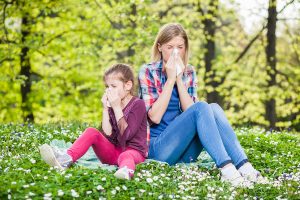How to Beat Ragweed Allergies
Ragweed allergy is a leading cause of allergic rhinitis (hay fever), which affects more than 23 million people in the United States.
75% of people who are allergic to pollen are also allergic to ragweed.
In the late summer, about 15% of Americans have symptoms from an allergy to ragweed pollen.
Have you noticed that your allergy symptoms have been getting worse recently? Ragweed could be the culprit. Whether it be constant sneezing, itchy and watery eyes, sinus infections or even asthma, allergies can really wreak havoc on your health.
Ragweed allergy season begins around early August, peaks in mid-September and ends in mid-October or November, depending upon where you live, or when the first frost kills the plant.
Ragweed is a weed that grows usually in rural areas throughout the United States, especially in the Eastern and Midwestern states. Each ragweed plant lives only one season and can produce up to 1 billion pollen grains. In mid-August, ragweed flowers mature and release pollen. Warm temperatures, reduced humidity and breezy conditions create the ideal environment for ragweed plants to release pollen. Ragweed pollen can travel far. It has been found in the air 400 miles out to sea and two miles up in the atmosphere, but most falls close to its source.
Seventeen types of ragweed grow in North America. Ragweed also belongs to a larger family of plants that can spread pollen by wind, and members of this plant family include:
- Sage
- Burweed marsh elder
- Rabbit brush
- Mugwort
- Groundsel bush
- Eupatorium
If you have allergies to one type of pollen, then you tend to develop allergies to other types of pollen, as well.
If you have a ragweed allergy, you may also get symptoms when you eat these foods, so it’s best to avoid these in the fall:
- Banana
- Cantaloupe
- Cucumber
- Honeydew
- Watermelon
- White potato
- Zucchini
- Sunflower seeds
This is called oral allergy syndrome and it occurs because your immune system confuses ragweed pollen with certain foods. Common symptoms include itchy mouth, throat, tongue or face.
Symptoms of exposure to ragweed pollen include:
- Sneezing
- Stuffy or runny nose
- Itchy nose and throat
- Itchy or puffy eyes
- Mucus in the throat (postnasal drip)
- Chronic sinusitis
- Headaches
- Congestion
- Asthma
- Coughing
- Hives
- Weakness or fatigue
Tips to Help Avoid Ragweed Pollen:
- Try to limit your time outdoors, especially if you are experiencing allergy symptoms. If you do go out, late afternoon is best since the pollen counts are highest mid-morning. You can check the pollen counts in your area by visiting www.pollen.com.
- Airing out your house is not recommended because the pollen will come right in and can cause allergy problems. If you do air out the house, be sure to change the air filter (an HVAC unit is recommended) when you are finished.
- If you do spend time outside, take your shoes off when you enter your home. Change your clothes and shower to decrease exposure to pollen.
- Pets bring in pollen on their fur. Be sure to wipe them down with a damp cloth when they come indoors.
- Take vitamin C daily for prevention of your symptoms. Quercetin is also helpful and can be taken with vitamin C. Both of these natural antihistamines will help block adverse effects of ragweed allergies. Dr. Hotze also created an Allergy Relief Pack with several top supplements to help prevent and relieve your allergy symptoms.
Dr. Hotze Discusses Ragweed Allergy Season
So what is the next step? How do you get relief if you are constantly suffering from allergies? We have a natural solution for you that will help you not only prevent but treat your allergy symptoms.
How We Treat Allergies at the Hotze Health & Wellness Center
We would like to share with you our breakthrough treatment for inhalant, food and chemical allergies: Low Dose Immunotherapy or LDI.
Low Dose Immunotherapy (LDI)
Low Dose Immunotherapy (LDI) can treat significantly more sensitivities than conventional allergy shots and it can be safely used in both adults and children.
LDI Addresses Over 300 Allergens
LDI is a unique therapy that has much broader effects, acts faster and is longer lasting than conventional allergy treatments. Rather than the 20–40 inhalant allergens in allergy drops and shots, LDI desensitizes you to more than 300 common airborne irritants, foods and chemicals. The best news is that since we administer LDI sublingually (under the tongue), this means you can take your dose at home! No more trips to the doctor’s office for allergy shots.
How it Works
The allergens and chemical antigens in LDI are administered sublingually in one dose every 7 to 10 weeks. Subsequent doses are titrated with different dilutions, depending on your symptoms, and are continued for an average of 2 ½ years. After that, you may require a booster dose every 12–18 months, although some guests have complete resolution of their symptoms and do not need boosters.
Unlike conventional allergy shots and drops, which stimulate the production of antibodies that block the allergic response, LDI essentially resets your immune system. It activates immune cells called T-regulatory (Treg) cells that shut off excessive immune activity and inflammation characteristic of allergies and hypersensitivities. Your sensitivity to allergens decreases with each successive treatment.
 Effective for Multiple Allergic Conditions
Effective for Multiple Allergic Conditions
LDI can be used for the treatment of a broad range of allergies, sensitivities and related symptoms, including the following:
- Respiratory: Hay fever, asthma, chronic rhinitis, sinusitis, cough, ear infections and postnasal drip.
- Skin: Eczema, hives and itchy skin.
- Food: Immediate and delayed reactions to food allergens.
The success rate for symptom improvement with LDI is approximately 90%, and treatment failures are rare.
Low Dose Immunotherapy (LDI) is Safe
LDI is exceptionally safe. The allergen/antigen doses are much, much lower than those used in conventional immunotherapy. The doses used in conventional allergy treatments may cause pain at the injection site, swelling, hives, and, in rare cases, life-threatening anaphylactic shock. No serious reactions have ever been reported with LDI. It is so safe it has even been used to treat children younger than one year of age.
 Ronald Parker, P.A., director of our allergy department, has specialized in allergy testing and treatment for more than three decades. He describes LDI as the most remarkable allergy treatment he has ever seen. “We are offering LDI to anyone who wants a treatment that will cover inhalant, food and chemical allergies. With this much broader approach, it works for all these things and more.”
Ronald Parker, P.A., director of our allergy department, has specialized in allergy testing and treatment for more than three decades. He describes LDI as the most remarkable allergy treatment he has ever seen. “We are offering LDI to anyone who wants a treatment that will cover inhalant, food and chemical allergies. With this much broader approach, it works for all these things and more.”
LDI’s Advantages Over Conventional Allergy Treatments
Here’s a recap of all the advantages of low dose immunotherapy:
- Broader coverage: LDI includes 300+ inhalant, food and chemical allergens, compared to 20–40 inhalant allergens in shots and drops.
- 90% success rate: Treatment failures are rare, including in people who have had little success with other allergy treatments.
- Faster results: Most people see improvements within the first three treatments, and many have reduced symptoms after the very first treatment.
- More convenient: Less frequent treatments are required, once every 7–10 weeks for the first year, tapering down in subsequent years and often terminated after about two and a half years with no loss of protection. Sublingual preparations can be shipped to you and administered at home.
- Exceptionally safe: No serious adverse effects have ever been reported.
- Less expensive: LDI is less expensive than years of weekly or biweekly allergy shots and daily allergy drops.
Take Charge of Your Allergies
Contact us today at 281-698-8698 for your complimentary allergy consultation with a Wellness Consultant. It will be our privilege to serve you!
Source: Ragweed Pollen Allergy, Ragweed Allergies
